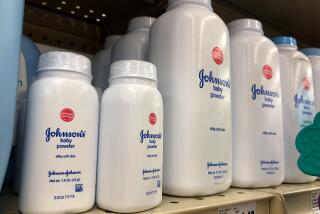Union Carbide Cleared in Kelly-Moore Asbestos Suit
- Share via
A Texas jury cleared Union Carbide Corp. on Friday of allegations that it had misled Kelly-Moore Paint Co. about the hazards of a type of asbestos that was mined in California.
Kelly-Moore had hoped to collect $1.5 billion from Union Carbide, a Dow Chemical Co. subsidiary. That is how much the San Carlos, Calif.-based paint company expects to pay to resolve cancer, disease and death claims filed by people exposed to asbestos in joint compound and other products it once sold.
Union Carbide sold its trademark Calidria asbestos largely as a thickening agent to a wide variety of manufacturers, including Kelly-Moore, between 1963 and 1985, when it sold its processing plant in King City, Calif. Union Carbide strip-mined the asbestos in the Diablo Mountains north of Coalinga, Calif.
Kelly-Moore alleged that Union Carbide duped it into buying Calidria by portraying the asbestos as a uniquely safe form of the mineral fiber.
Jurors in Texas state court in Angleton, not far from Union Carbide headquarters in Houston, reached a verdict after deliberating less than three hours. Testimony lasted six weeks.
“Clearly this was a blatant attempt by Kelly-Moore to duck responsibility for their own customers and legal troubles and shift the blame to a minor fiber supplier,” said Peter Bicks, Union Carbide’s lead trial lawyer.
Mark Lanier, Kelly-Moore’s lawyer, said: “We were all stunned.”
It was the second loss for Kelly-Moore in an asbestos case this week. On Wednesday, a Los Angeles jury tagged the company with liability for 14% of a $36.6-million award to a 60-year-old Washington man suffering from mesothelioma, an incurable asbestos-related cancer.
Among his asbestos exposures, Robert Treggett used Paco Quik-Set joint compound when he remodeled his father’s Tarzana home in the mid-1970s, said his lawyer Michael Armitage. The product, sold by Kelly-Moore, contained asbestos from Canada.
The stakes were much higher in the suit against Union Carbide. The loss means the paint company’s only escape from potentially crippling asbestos liabilities may be bankruptcy protection, an option that has been taken by more than 60 other companies that sold asbestos.
Union Carbide, for its part, hopes that the verdict will dissuade other former customers from filing similar suits.
Union Carbide’s next face-off may be in Los Angeles, where Lanier has sued on behalf of Hamilton Materials Inc., a privately held company in Orange that used Calidria in joint compound and faces more than $100 million in related claims.
Lanier also said he intended to file suits naming Union Carbide on behalf of 150 mesothelioma victims. In such cases in recent years, Union Carbide has argued that studies show Calidria to be virtually harmless.
That was not an issue in the Kelly-Moore case.
“It is important to recognize that the verdict for Union Carbide in this fraud case does not mean that the jury agreed with Carbide” that Calidria is safe, said Christian Hartley, a South Carolina lawyer who has represented several plaintiffs.
Jurors in the Kelly-Moore trial had to decide whether Union Carbide lied about its knowledge of asbestos hazards in persuading the paint company to buy Calidria. Union Carbide argued that it advised Kelly-Moore of the potential hazard and that the paint firm was a sophisticated user that bought asbestos from many suppliers.
Kelly-Moore also received information about asbestos hazards from regulators, other suppliers and its insurance carrier, Union Carbide argued.
More to Read
Inside the business of entertainment
The Wide Shot brings you news, analysis and insights on everything from streaming wars to production — and what it all means for the future.
You may occasionally receive promotional content from the Los Angeles Times.











